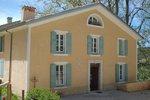The prehistoric village
By finding the prehistoric village on the banks of the Verdon, you will discover different types of habitats, from 1.8million years ago to the Bronze Age. Prehistoric village reconstructed where every year in mid-July takes place the days of Prehistory, a weekend of free events for families.
6 points of interest
 Patrimony and history
Patrimony and historyHut of Cambous
2,500 years BC, pastors of Languedoc garrigues were organizing villages of dry stone huts, sometimes consisting of about forty houses. Some huts had very thick walls and were over 20m long.
 Patrimony and history
Patrimony and historyDolmen of Provence
Dating back to the late Neolithic – 4,500 years BC, the dolmens (or flat stone table in Breton) are not dwellings (or eternal ones!) but collective graves.
 Patrimony and history
Patrimony and historyThe Prehistory Days
A weekend that takes place in mid-July every year: free events for all the family! The Days of Prehistory in Quinson are scientific, educational and recreational events, and make children and adults interested and curious. Known for being one of the most important periods devoted to prehistory in France, Quinson Days offer a comprehensive program of workshops and demonstrations of all types every year. Return to the past guaranteed!!
 Patrimony and history
Patrimony and historyThe loved earth or Terra Amata
Inside the hut, traces of fireplaces and bones of animals and chips from carving activities were discovered. A more complete reconstruction can be found in the Museum of Terra Amata in Nice that exhibits all the reproduced elements. Dating - 400,000 years BC.
 Patrimony and history
Patrimony and historyTipi of Pincevent
At Pincevent, in the Paris Basin, traces of "stakes" were revealed. Prehistorians imagined that animal skins were stretched over the structure. Dating - 15,000 years. The type of house was similar to that of American Indians.
 Patrimony and history
Patrimony and historyNeolithic house of Chavarine
In the Isère, in the Neolithic (- 5,000 years), men built houses made of wood, mud and reeds. They were grouped in villages called "pile dwellings". Today this hut is no longer present on the site and must be rebuilt.
Description
From the parking lot, head towards the pedestrian access to the Prehistory Museum. Exit the car park, leave the ascent to the village and the museum and turn right on the paved road. It passes between tennis courts and camping grounds and joins the road along the Verdon.
1- For the pedestrians, reach the nautical base and follow, on the left, the dirt road along the Verdon. It leads to, after 500m by the water, the prehistoric village. For people with reduced mobility, stay on the small road that runs along the campsite. At 500m it reaches the entrance of the prehistoric village (the site can be occasionally impassable after heavy precipitation; dirt road!). Return by the same route to the starting point
- Departure : From the prehistory parking lot
- Arrival : In the prehistory parking lot
- Towns crossed : Quinson
Forecast
Altimetric profile
Information desks
House of the Verdon Regional Nature Park
Domaine de Valx, 04360 Moustiers-Sainte-Marie
House of the Verdon Regional Nature Park
OT Quinson
Chapelle Saint-Esprit, 04500 Quinson
Transport
Access and parking
22km south east of Greoux-les-Bains on the D952, D315, D82
Parking :
Accessibility
Report a problem or an error
If you have found an error on this page or if you have noticed any problems during your hike, please report them to us here:


